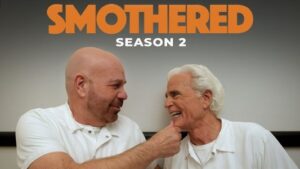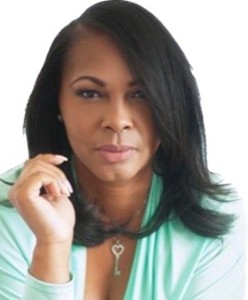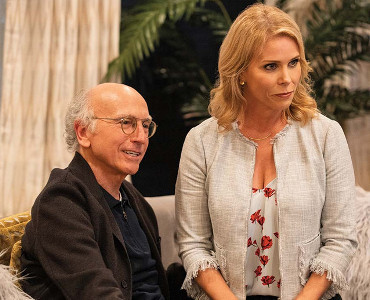TV Interview!

Interview with Simon Frederick, Eunice Olumide and Jidenna of “The Outsiders?” on YouTube by Suzanne 9/23/21
The Outsiders? TCA Panel
Simon Frederick, Director
Eunice Olumide, Actress, Model & Broadcaster
Jidenna, Recording Artist & Producer
2021 Virtual Tour Los Angeles, CA September 23, 2021
© 2021 YouTube Originals. All rights reserved.
This was an interesting panel. I hadn’t seen the series ahead of time, so I wasn’t sure what to ask. I did think of some things to ask, eventually, as the panel continued.
The first journalist asked Simon Frederick how he decided which artists should go in his documentary series.
He said that Jidenna was someone that he wanted to speak with for a long time because of his song “Classic Man” and that he was born in Nigeria but lived in America, which sparked a “cross-cultural conversation.” The other panelist, Eunice Olumide, has had a great influence on Scottish culture; she has a bill going through Parliament that will mandate black history to be taught in schools in Scotland. He praised her, “I’ve always said that Eunice will make a great politician one day because in Scotland she has been able to affect Scottish culture in a way that Black people just don’t do.” He pointed out that both are brilliant people under 40 that have created things that never existed before. He said they were “owning Black culture in a way that, not only is inspiring to us as Black people, but actually inspiring to all of us as human beings.”
Olumide talked about the bill, which started as a petition to the Scottish government. She felt there was not enough being taught about “the significant contribution of African people, African diaspora to the west not only to the UK, but to the western world in general.” She loves that their documentary talks about “trauma porn” (which is focusing on the negative things that have happened to black people in history). She believes that it’s better to focus positive things that have happened, “to ensure that we are educating and archiving the huge, and tremendous, positive contributions of people of color to the world today.”
Another reporter asked the panel whose shoulders they stand on, and how they are building up their own shoulders so that others in their community can stand on theirs.
Olumide credited her mom, and performative activism done by Afro-Caribbean people. She mentioned that she was awarded a British MBE. She admited, “I was quite unsure about whether I wanted to receive that or not because of Britain’s history concerning the transatlantic slave trade and colonialism. And one of the things that actually my mom highlighted to me was that I needed to also understand the vast and extensive history and background of all of the people that came before me. And I needed to also understand that it’s about archiving and making sure that we are documenting historically the contributions of people of color, of African people, to the world.”
Jidenna agreed with what she said and then added his opinion. He said that he did stand on the shoulders of his late father, and he talks about him in this documentary series. He told us that he was “the first African to produce a commercially-produced PC in our history, in Sub-Saharan African history. And he did that in the 80s in the same time that Gates and Jobs were building their computer franchises. It’s not a history that people know.” He maintained that many stories of black history and narratives have been taken away from its people, so this series is making sure that “we are etched into history and we are telling our stories.” He complimented Frederick that this “might be his best work yet.” He remembers that his father advised him that life is like a relay race, “The most important thing is not you running, but the baton which you are not allowed to drop or you will be disqualified.” Not only is he standing on his father’s shoulders, “but what’s immediately important are people like Eunice, are people to my sides who are in my generation and my peer group, because I think our generation is one of the most amazing generations that’s come in the last hundred years.” He told us that “our fight … is to create more space for different archetypes of African descent and for us across the Diaspora to hear each other’s stories where previously a lot of the film that you’ll see in the last 100 years were exports from the U.S. So you’re getting predominantly the Black American experience, but you’re not getting as much of the Caribbean American or the First Gen African. You’re not seeing as much of the films that are coming out of the UK. You’re definitely not seeing what’s coming out of France, but now because of the internet, Wi-Fi, Instagram… we’re seeing experiences not only in Europe, in America, but definitely in Africa. And, finally, thank God, we have a world that views Africa as much cooler than it was before, and I don’t think we’re in a trendy era, and we’re knowing that now, and I think Simon is capturing that worldwide: the new, global Black experience.”
Frederick added that he stands on the shoulders of his parents. He wouldn’t be where he was today without his mom’s “love and encouragement… [when you grow] up as a young, Black child you’re told that education is key, and if you’re drawing and painting and doing stuff like that is you’re soon told not to do that, because you’re never going to have a career and all they’re trying to do is keep you safe.” He has his father’s stubbornness, which is what made him keep going with his music. He also credits those who came before him, such as “Sir Harry Belafonte,” whom he met for a lengthy interview. It changed his life because “it solidified why I do what I do and the importance of doing what I do, of telling stories, of putting a humanity in Black storytelling that’s always been there, but it’s been taken away from us. But, also, following in the footsteps of people like the great Gordon Parks, who a photographer, a filmmaker, a musician, a renaissance man. I am trying to follow in his footsteps and continue his tradition for storytelling in both moving and still imagery.”
For my question, I referred back to what Jidenna said about us not seeing so many African or international works. I pointed out that because of the pandemic, people here in the U.S. (and probably other Western countries) are watching more of that and asked whether he thinks that will continue once we’re out of the pandemic.
Jidenna replied, “Yes, absolutely. That’s a keen observation, and I can tell you Eunice and Simon, you probably don’t realize this as much unless you’ve been stateside, because I believe the question is aimed at the U.S. market. Really, my whole upbringing, I was one of the few people that was able to watch overdubs and subtitles. So many times, you hear people like, “Oh, it’s got subtitles? Oh, I don’t want to watch it.” Or it’ll be like, man, unless it was like a kung fu flick, they don’t want to see the slight latency in the overdub. Right now, to your point, people were tired of just watching whatever their regular show was so they’re exploring a lot more, and there’s a huge demand, and I’d love to see the numbers on it. So the beautiful thing is that some things with the pandemic that may have seemed short-lived will be long-lived. It’s not just long COVID that’s going to be the byproduct of the pandemic. It’s going to be the new cultural interests, I think, in the world. It was the first time that the U.S., in our lifetime, that the U.S. was included in a plague. We often have the benefit of the Atlantic Ocean and the Pacific Ocean and presidents that are a little bit smarter than our previous one. But in this case, we were part of the world and it forced us to be, and that’s why you have an interest in films from abroad. I definitely think that this is something here to stay, and people are working hard to produce more films that can still cater to the U.S. market, so we’re right on time with that.” I wanted to add to that there are many foreign TV series available to us more now, too (not just films).
Enjoy the documentary!
MORE INFO:
Trailer Watch it here!
This new six-part docuseries from visionary filmmaker and photographer Simon Frederick brings to life the Black experience through stories and personal anecdotes of a seminal cast of young Black actors, musicians, creators, artists, and personalities that are shaping popular culture as we know it. “The Outsiders?” challenges notions that anti-Black sentiment is a national or regional issue, weaving the cast’s experiences into a cohesive set of themes that underscore the universal nature of what it means to be Black around the world. The cast’s revealing truths and untold stories are tragic, thought-provoking, and inspiring. From the YouTube Black Voices fund, “The Outsiders?” premieres globally on October 4.
From director and photographer Simon Frederick, comes the next installment in his portrait documentaries, untold stories of young Black visionaries shaping our future. In raw, real, and deeply personal conversations, you’ll hear 41 creators, musicians, artists, authors, athletes and more discuss topics like equality, structural gaslighting, and social media.
Guests include, Mo Gilligan, Phillip Youmans, Munya Chawawa, Alex Scott, Fenn O’Meally, Niko Omilana, Leigh-Anne Pinnock, Elladj Balde, Alicia Garza, Jidenna, Campbell Addy, Eunice Olumide, Ncuti Gatwa, George The Poet, Candice Braithwaite, Kailand Morris, Shaun Ross, Clara Amfo, Amanda Seales, Sophie Duker, Jidenna, Taylor Richardson, Jamal Edwards, MNEK, Chanel Ambrose, Tinashe, Suli Breaks, and Julie Adenuga.
Proofread and Edited by Brenda
Back to the Primetime Articles and Interviews Page


 Smothered is the short form series from creators Jason Stuart & Mitch Hara which will be coming back for its highly anticipated 2nd season in May 2023 on all major streaming services including Amazon. Smothered was named ‘One of the best comedy series’ by Amazon for their first season and was nominated for the Spotlight Award at the Indie Series Awards. Stuart, a respected actor/comedian/activist with over 150 film & TV credits, and in 2022 was named one of Out Magazine’s OUT 100 (which highlights the most popular and influential LGBTQIA+ celebrities in the US), won Best Actor in a Comedy Series for Smothered’s first season by the Indie Series Awards. Mitch Hara is a graduate from the acclaimed Actor’s Studio in NYC and has appeared on numerous film and television series. Season 2 of Smothered promises to be even bigger and better than season 1 and boasts an impressive cast of guest stars that include Amanda Bearse (Married w/ Children), Jai Rodriguez (Bros), Carole White (Laverne & Shirley), Scott Krinsky (Chuck), and more. Smothered follows an entitled bickering boomer aged gay couple (Stuart & Hara) who, because they can’t afford to get a divorce, try and salvage their hideous relationship in therapy hell before they kill each other and everyone else.
Smothered is the short form series from creators Jason Stuart & Mitch Hara which will be coming back for its highly anticipated 2nd season in May 2023 on all major streaming services including Amazon. Smothered was named ‘One of the best comedy series’ by Amazon for their first season and was nominated for the Spotlight Award at the Indie Series Awards. Stuart, a respected actor/comedian/activist with over 150 film & TV credits, and in 2022 was named one of Out Magazine’s OUT 100 (which highlights the most popular and influential LGBTQIA+ celebrities in the US), won Best Actor in a Comedy Series for Smothered’s first season by the Indie Series Awards. Mitch Hara is a graduate from the acclaimed Actor’s Studio in NYC and has appeared on numerous film and television series. Season 2 of Smothered promises to be even bigger and better than season 1 and boasts an impressive cast of guest stars that include Amanda Bearse (Married w/ Children), Jai Rodriguez (Bros), Carole White (Laverne & Shirley), Scott Krinsky (Chuck), and more. Smothered follows an entitled bickering boomer aged gay couple (Stuart & Hara) who, because they can’t afford to get a divorce, try and salvage their hideous relationship in therapy hell before they kill each other and everyone else.















